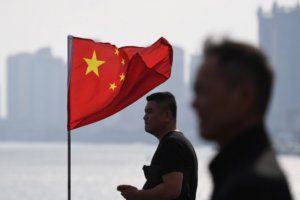
KYIV. Nov 9 (Interfax-Ukraine) – The State Architectural and Construction Inspectorate should create the service of the electronic cabinet of developers, the press service of Deputy Prime Minister of Ukraine, Regional Development, Construction, Housing and Utilities Economy Minister of Ukraine Hennadiy Zubko reported on Thursday.
“Today, the priority task for the inspectorate is to work out with the business a new concept of work through the introduction of an electronic cabinet of the developer with connecting all the necessary registers. Creating a new service will remove officials as much as possible from the licensing procedures,” Zubko said during an open discussion of the Regional Development, Construction, Housing and Utilities Economy Ministry and the inspectorate with representatives of construction industry and specialized associations.
According to Head of the State Architectural and Construction Inspectorate Oleksiy Kudriavtsev, the electronic cabinet of the developer will contain all the documentation about the construction project: from the moment of submitting the application for the start of preparatory work to commissioning. This should minimize the possibility of corruption risks between the developer and the inspectorate.
“Together with the government-public initiative “Together Against Corruption” we are considering the creation of electronic cabinets for builders, which means the maximum transition to online communication. There will be an electronic cabinet, let’s talk in it and everyone will see where the documents are, the deadline for consideration, the construction stage, and other things,” Kudriavtsev said.
He also said that the plans include connecting local authorities to the online platform for reviewing permits for the construction in the Transparent State Architectural and Construction Inspectorate launched in October.
Zubko said that despite the simplification of licensing procedures and the decentralization of the powers of the inspectorate, the problem of corruption remains.
“We have already begun to work together with the prosecutor’s office and the prosecutor general regarding abuses on the ground. There are already significant results in personnel matters, and we will continue this work,” the deputy prime minister said.

U.S. Secretary of Energy Rick Perry during his visit to Ukraine on Monday, November 12, will speak to representatives of U.S. business in Ukraine and members of parliament. The U.S. Embassy in Ukraine reported that on November 11, Perry will pay tribute to the memory of the Heroes of the Heavenly Hundred in Instytutska Street in Kyiv. On November 121, the secretary of energy will speak to representatives of the American Chamber of Commerce in Ukraine and the U.S.-Ukraine Business Council (USUBC) in the Intercontinental Hotel.
Perry will also make a speech, addressing people’s deputies of the Verkhovna Rada and other guests in the Diplomatic Academy.
As reported, the secretary of energy will meet Ukrainian Prime Minister Volodymyr Groysman on November 12.

China is planning investment projects for the creation of multimodal cargo terminals in the Ukrainian territory on the border with the EU as part of the development of transit with the European Union. Deputy Infrastructure Minister of Ukraine for European Integration Viktor Dovhan met with Chinese Vice Prime Minister Liu He, the leadership of the National Development and Reform Commission of China, and the Ministries of Transport and Commerce of China within the transport initiative “One Belt, One Road” in Beijing on November 8-9, 2018.
The parties noted the need to develop transit from China to the EU.
“The Chinese side noted that this year 6,500 containers have been transported to Austria, and cargo traffic along the Trans-Caspian international transport route is growing. Investment projects are planned for the creation of multimodal terminals on the border with the EU (Lviv, Kovel, and Uzhgorod),” the Ministry of Infrastructure said.
In addition, the ministry stated that agreements have been achieved on signing an agreement on road transport between Ukraine and China with Deputy Minister of Transport of the People’s Republic of China Liu Xiaoming until May 2019. This agreement will allow companies in both countries to transport goods in the territory of the other state regardless of the established routes, based on the needs of logistics and trade.

The business delegation of Pharmexcil, the Pharmaceuticals Export Promotion Council of India, will visit three importing countries, including Ukraine, Turkmenistan and the Russian Federation at the end of November. The Indian Pharmaceutical Manufacturer’s Association (IPMA) said the delegation of Pharmexcil will hold business meetings with the local pharmaceutical companies and regulatory agencies to stimulate Indian pharmaceutical exports.
In Kyiv, the delegation of Pharmexcil will meet with the representatives of the Ministry of Health and pharmaceutical companies.
According to Pharmexcil, the sales of Indian medicines in Ukraine in 2017-2018 increased by 14.4%, to $95.96 million. In the 2016-2017 fiscal year, India exported pharmaceutical products worth $83.91 million to Ukraine.
India as a manufacturer in Ukraine in 2017 ranked third in terms of pharmacy sales in packages after Ukraine and Germany, and in monetary terms (in the national currency) it ranked fourth after Ukraine, Germany, and the United Kingdom. Among the Indian pharmaceutical companies that are actively working in Ukraine, in particular, are Macleods Pharmaceutical, Dr Reddy’s, Euro Lifecare Ltd.

China Railway International Group has confirmed the completion of the preliminary feasibility study for a project to build the fourth subway line in Kyiv, Deputy Head of the Kyiv City Administration Dmytro Davtyan has said. “… Together with representatives of the Ukrainian delegation, I met with the leadership of China Railway International Group. I received an official letter from the head of the company’s board, which officially confirmed the completion of the preliminary feasibility study for the construction of the fourth subway line,” he wrote on his Facebook page. According to him, the Chinese company also provided a pre-feasibility study, which will be presented in Kyiv.
Earlier Kyiv City Mayor Vitali Klitschko said that the construction of the fourth subway line will begin after the completion of the Podilsko-Voskresensky Bridge and will last five years. The cost of construction is estimated at $2 billion. At the same time, it is proposed to provide 85% of the project’s projected cost through a loan from Chinese financial institutions.
CHINA RAILWAY, COMPLETES STUDY, CONSTRUCTION PROJECT, FOURTH, SUBWAY